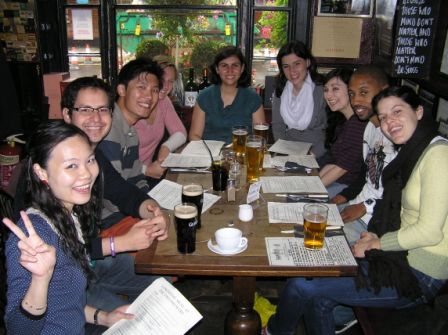 |
| Justin O'Brien says "Start with a party: One of the best ways to fast track your high performance team." Royal Holloway MBA 2012 members comparing notes over a traditional pint. | | " |
(1) Texting is not
communicating.
It’s cheap, it’s
easy.
Low cost suggests limited effort,
easy suggests unimportant.
Email can be
similar.
Use difficult to avoid communication
approaches (a) short telephone calls (not to voice mail) and even better (b) in
person meetings as this is the best way to gauge all the non-verbal
communication messages that indicate distress/unhappiness/problems/lack of
interest.
If you are angry or frustrated at
poorly perceived performance – put it into words and talk it through. Do you think that shouting at someone along
the lines of “where is your input ?” is going to result in anything but a
mouthful of abuse and or defensive behaviours.
Remember, often in txt (sic) language across cultures and email the rich
two way exchange of communication is lost.
(2) Group work is not easy. On a per word per student basis often the
volume of output is less.
Ever wondered
why ?
Because it is expected that
setting up a group, learning each others strengths and weaknesses, planning and
co-ordinating inputs takes time and effort.
To treat a group assignment as merely a piece of work you split into
four (or however big your group is) individual elements that are neatly zipped
together at the end, requiring little or no collaboration is entirely missing
the point.
If this
was the desired way of working it would be described as something like “zipped
together individual work”.
It shows to
the marker and gets scored down accordingly.
(3) Harness the creative,
variety of skills within your group.
It is often easier to work in a group where everyone is like you – you
are easily deluded into feeling that because your group is like minded that you
are able to go further, faster. Whilst
this might appear to ‘successful’ there is interesting research that suggests
that heterogeneous group make up can lead to more innovative (& therefore
successful) outcomes. The trick of
course is to put in place mechanisms to ensure the variety of talents are
identified within the group and carefully managed together. And if Billy and Jo really don’t get on – why
not construct a process that facilitates this.
Elton John, the legendary British performer never worked in the same
room as co-creative Bernie Talpin – it just didn’t work – but they churned out
hit after hit for several decades, with Elton putting the words to Bernis
tunes.
(4) Groups really should Form,
Storm, Norm, Perform – Tuckman’s theory (undertaken in a mental
health institution) that suggests a natural journey that sees groups struggle
(Storm phase) before understanding how to work together, norming – which might
include a list of principles or rules to ensure harmonious working ensues
(Performing).
(5) Define success. Often in a student group many are going for
top marks, whilst others are happy to get a solid 55%. Understanding this may see more appropriate
skills and motivational matching of group work.
You don’t all have to do 25% (for groups of 4) – matching skill sets and
particularly motivation appropriately can be very important. Not everyone is comfortable writing complex
prose – but equally, not everyone is great at making a group work and ensuring
the group is working well. Perhaps it is
entirely fair and equitable for a ‘just pass’ / low motivation student to do a
bit less, or take a less crucial role at the front end of the process.
(6) Identify the different
roles required in the group – understand everyone’s natural group working
style. Remember too many cooks spoil the
broth – sometimes great leaders know how to follow. Developing your own personal skill set and
capability awareness can come from asking others for feedback – “How can I
improve ?” “Could I have handled that
better ?” (Developmental feedback when
you have messed up does not thrust itself upon you). Businessballs.com is a useful web resource
for team building exercises and a variety of practical management and
leadership tools. You may find personal
awareness/style insight tools such as Myers-Briggs Type Indicator or Belbin
useful in these kinds of situations.
(7) Give each other feedback
regularly. The feedback sandwich (start
and finish on positive/appreciative feedback, fill the sandwich with
developmental comments) can help you earn the right to make suggestions for
improved performance by winning the trust of group members by complementing and
appreciating good performance. Catching
people doing it right is a positive motivational technique – we all like to be
told we are doing well and valued. Make
a habit of making positive appraisals of fellow group members performances –
they notice when it isn’t there and will want to know why. Having someone seek out developmental
feedback from you is ideal – as they will want to listen to what you have to
say. Machine gunning negative feedback
just sees everyone take cover and wait until you have gone away.
(8) Ask for feedback.
Creating a culture where 360
feedback (up, down and across an organisational hierarchy) can be very
powerful. Asking for feedback on your
own performance can give you valuable insights into ‘blind spots’ weaknesses/failings
you did not know about. Quite often
people are unaware of things they do that annoy or frustrate their peers and it
can be things that are easy to change. Knowing about your own weaknesses helps
develop a strong sense of self-awareness – a question that is very likely to be
put to you in every interview you sit.
(9) Plan. Plan. Plan.
Assignments often seem to behave
like London
buses – you wait around a long time to catch one and then three of them turn up
all at once – and you just wanted the one !!
The stress caused by poor time management is particularly noticeable in
the School of Management during busy end of term hand
in events. Remember a basic law of
science, “Your capacity to undertake high quality work does not (usually)
increase the closer you are to an assignment deadline.” To be honest, unless you are super human,
with stress and anxiety, your effective productivity will decline. The best way to focus on a project is to have
one project – so why not slice your time into three periods and plan to work on
projects back to back – rather than spreading yourself thinly across multiple
projects. The focus should concentrate
your efforts and ensure more satisfactory outcomes.
Work out a time plan, put in a
contingency (someone is going to be sick, your hard drive
will fail) and
work to your own completion deadline – not 1400 in the Moore Building
foyer.
(10) Start with a party. Group work should be fun, start out as you
want to – enjoying your work will ensure you put your best in and hopefully so
do others. Play spin the bottle in
Medicine, a game of badminton or go on a
tourist trip into London are just three ways a group can spend time together
and fast track towards effective team working.
(Businessballs.com has more ideas). Understanding what makes your team members
tick, knowing what else is going on in their lives (getting married, family
problems, health issues, relationship issues) really helps understand how to
handle unplanned situations. You never
know – you become good friends and enjoy future interactions.

